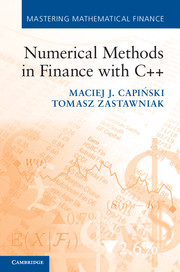
-
Select format
-
- Publisher:
- Cambridge University Press
- Publication date:
- August 2012
- August 2012
- ISBN:
- 9781139017404
- 9781107003712
- 9780521177160
- Dimensions:
- (228 x 152 mm)
- Weight & Pages:
- 0.41kg, 175 Pages
- Dimensions:
- (228 x 152 mm)
- Weight & Pages:
- 0.29kg, 175 Pages
You may already have access via personal or institutional login
Book description
Driven by concrete computational problems in quantitative finance, this book provides aspiring quant developers with the numerical techniques and programming skills they need. The authors start from scratch, so the reader does not need any previous experience of C++. Beginning with straightforward option pricing on binomial trees, the book gradually progresses towards more advanced topics, including nonlinear solvers, Monte Carlo techniques for path-dependent derivative securities, finite difference methods for partial differential equations, and American option pricing by solving a linear complementarity problem. Further material, including solutions to all exercises and C++ code, is available online. The book is ideal preparation for work as an entry-level quant programmer and it gives readers the confidence to progress to more advanced skill sets involving C++ design patterns as applied in finance.
Reviews
"This book leads the reader directly into the heart of C++ programming technique without too much fuss. And in so doing, the reader also learns some very important and fundamental methods in options pricing. I highly recommend this little gem of a book."
Professor Michael K. Ong, IIT Stuart School of Business
"I find the monograph to be an excellent integration of the object-oriented concepts of C++ and the classical numerical techniques used in quantitative finance. Throughout the book, there is an introduction to the numerical technique to be used, along with the need for such a method from the prospective of financial mathematics. After this discussion, the C++ source code that implements the technique is not only given but also annotated to highlight or to clarify reasons for the use of certain object-oriented constructs. As the authors comment, there are some source files which are not listed but are available from the publisher's web site.
The monograph is an exceptional book for demonstrating the implementation of the various aspects of C++ in a very concrete fashion. There is substance given to C++ concepts that are introduced in basic programming courses but seldom framed in a realistic setting. The reader, however, should have some familiarity with C++ and mathematical finance, prior to reading the monograph. The book is not intended to be an introduction to either object-oriented C++ or mathematical finance. With such a background, the style and the content of the book make for an informative experience."
Professor Sherman Wong, City University of New York
Contents
Metrics
Full text views
Full text views help Loading metrics...
Loading metrics...
* Views captured on Cambridge Core between #date#. This data will be updated every 24 hours.
Usage data cannot currently be displayed.
Accessibility standard: Unknown
Why this information is here
This section outlines the accessibility features of this content - including support for screen readers, full keyboard navigation and high-contrast display options. This may not be relevant for you.
Accessibility Information
Accessibility compliance for the PDF of this book is currently unknown and may be updated in the future.

